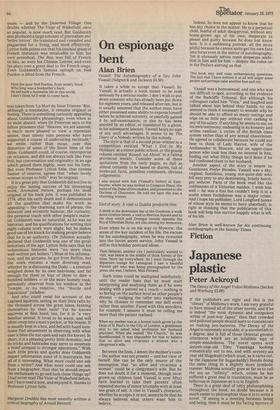On espionage bent
Alan Brien
Vassal': The Autiobiography of a Spy John Vassal! (Sidgwick and Jackson £4.50) It takes a while to accept that Vassall, by Vassal!, is actually a book meant to be read seriously by a serious reader. I don't wish to put down someone who has already been put down for eighteen years, and released after ten, but it is usually assumed that the author must have either possessed some ability to express himself before he achieved notoriety, or painfully gained it by self-examination; or else he has been assisted by an editor, or translated by a ghost, in his subsequent labours. Vassall bears no sign of any such advantages. It seems to be The Diary of a Nobody written by the nobody.
The style is that of a second prize-winner in a competition entitled 'What I Did In My Holidays' at a minor public school, or the gossip column entitled `Round-'nd-About' in a failing provincial weekly. Consider some of these quotations from the early pages, so dull as almost certainly to be based on diaries, full of irrelevant facts, pointless comments, obvious judgements:
I also stayed with him [Vassall's father] at Eastbourne, where he was invited to Compton Place, the home of the Duke of Devonshire, and presented to the Duchess of Gloucester. He told me later she was a charming woman.
End of story. A visit to Dublin produces this:
A drink in the downstairs bar at the Gresham, a walk down Grafton Street, a visit to Merrion Square and to the shop which sold Donegal tweeds opposite the Royal Hibernian Hotel, are also among my memories.
Even when he is on his way to Moscow, the scene of the key incident of his life, the excuse for his autobiography, when he was recruited into the Soviet secret service, John Vassall is still in this holiday postcard idiom.
Then Helsinki, another city I particularly wanted to visit, was below in the middle of thick forests of fire trees. Snow lay everywhere. As I went through the departure lounge for Leningrad I saw a beutiful Finnish girl who was being photographed by the press; she was, I believe, Miss Finland.
Such items could be multiplied indefinitely, until the reader feels that he must start interpreting and analysing them as if he were dealing with a patient on a couch — nothing is so boring on the surface level as other people's dreams — nudging the teller into explaining why he chooses to remember one dull event rather than another. Faced with this anecdote, for example, I assume it must be telling me more than the patient realised:
When my mother was at a formal lunch given by the Dean of St Paul's in the City of London, a gentleman next to her asked what profession her husband practised. When she replied "the Church," he was dumbfounded. It was impossible for him to believe that so alive and vivacious a woman was a clergyman's wife.
Between the lines, I detect the mother's voice — the author was not present — and her view of herself. She can be the only source of the assumption that "so alive and vivacious a woman" could be a clergyman's wife. But he does not doubt it for a moment, though most grown-up children (and Vassal] is now fifty) have learned to take their parents' often repeated stories of minor triumphs with at least one grain of salt. A clue to Vassall's character, whether he accepts it or not, seems to be that he always believes what others want him to believe. Indeed, lie does not appear to know that he has any choice in the matter. He is a perpetual child, fearful of adult disapproval, without any home-grown ego of his own, desperate to please and guilty because he does not know how. It is a saddening portrait, all the more pitiful because he cannot quite get his own face into focus even in the mirror of autobiography. Yet it obviously serves some desperate ambition in him and for him — despite the eome-on in the Preface alerting us that
This book may well raise embarrassing questions. The fact that I have written it at all will anger some people and perhaps raise another hue and cry.
Vassall was a homosexual, and one who was not difficult to spot, according to the evidence of the Radcliffe Tribunal. But although his colleagues called him "Vera," and laughed and talked about him behind their hands, no one seemed to think it necessary to wonder why he should be able to afford so many outings and trips on so little pay without ever cashing in any of his salary. If anything he seems to me, on his Own testimony, endearing in its honesty and artless candour, a victim of the British class system rather than of any sexual chauvinism. He agreed to collaborate because he could not bear to think of Lady Hayter, wife of the Ambassador in Moscow, and an upper-class person who took less than no interest in him, finding out what filthy things he'd done if he had confessed them to her husband.
Another aspect of the story is nearer to Gentlemen Prefer Blondes. Vassall was a shy, virginal, fastidious, young not-quite-deb who fell easy prey to any dominating, bristly butch, gay seducer. Parts of the book read like the confessions of a Victorian maiden. I wish him well — he was a fool but couldn't help it in a world where foolishness was a major crime. And I hope his publisher, Lord Longford (some of whose style he seems to have absorbed), is right in thinking that the publication of this book will help him survive happily what is left of his life.
Alan Brien is well-known for his continuing autobiography in the Sunday Times
Fiction


























 Previous page
Previous page